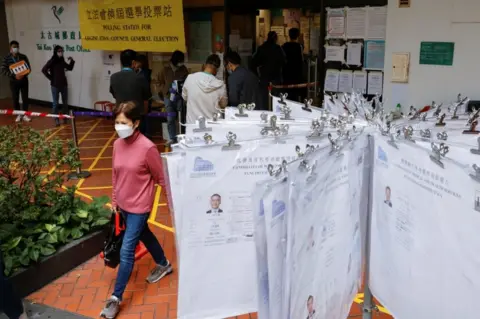Hong Kong: Pro-Beijing candidates sweep controversial LegCo election
 Reuters
ReutersPro-Beijing candidates have claimed a victory in Hong Kong's Legislative Council (LegCo) election, as the city saw its lowest-ever voter turnout.
It was the first LegCo election since China made sweeping and controversial changes to the city's electoral system.
Officials argue the changes were needed to ensure stability, but critics say they weakened democracy.
On Monday, Beijing also unveiled a statement outlining "democracy with Hong Kong characteristics".
In a white paper released hours after election results were announced, China said Hong Kong was now entering a new stage of "restored order" as a result of these Beijing-introduced changes.
But a group of Western nations expressed "grave concern over the erosion of democratic elements" in Hong Kong's electoral system.
"Since handover, candidates with diverse political views have contested elections in Hong Kong. Yesterday's election has reversed this trend," the foreign ministers of Australia, Canada and New Zealand, the British foreign secretary and US secretary of state said in a statement. "These changes eliminated any political opposition."
'Beijing's people winning'
The LegCo, Hong Kong's mini-parliament, is a powerful body that makes and amends laws in the city.
One analysis by local news outlet HK01 found that 82 of the 90 seats were won by members from pro-establishment and pro-Beijing camp. Only one candidate was from a non-establishment camp, and the rest had unknown political backgrounds.
Government officials had urged the city's 4.5 million registered voters to take part in the election, and had made public transport on Sunday free as well as sent out mass texts to encourage a higher turnout.
But in the end only 30.2% of voters participated, amid wide apathy about the poll. One woman, an accountant in her 20s, told AFP news agency: "My vote won't mean anything because ultimately it's Beijing's people winning."
Some activists were arrested after they had urged people to boycott the election or to leave their ballots blank as a protest. While casting a blank vote is legal, it is now against the law to incite anyone to do so, or to encourage them not to vote.
 Reuters
ReutersIn March, Beijing had passed a "patriots governing Hong Kong" resolution that fundamentally altered LegCo.
It drastically shrank the proportion of lawmakers who can be directly voted in by the people; ensured candidates had to be vetted by a separate screening committee; and gave seats to the Election Committee, a group that heavily skews pro-Beijing.
Only 20 of the 90 legislative seats were directly elected by the public. Nearly half were picked by the pro-Beijing Election Committee and the rest chosen by special interest groups like business and trade - which also historically lean towards Beijing.
The move was widely seen as a continuation of China's plan to tighten control over Hong Kong and push for loyalty from all levels of power, following 2019's huge pro-democracy protests.
It was also the first general election since China introduced a new national security law, making it easier to punish pro-democracy protesters.

Analysis by Martin Yip, BBC Chinese, Hong Kong
For journalists, it has been an uneventful night at the press centre. But for the biggest pro-Beijing party, the DAB, it is a night of triumph. "DAB sure win," they chanted. The more seats they won, the louder they chanted.
Just as people thought the "non-establishment" camp was to face a total loss, one candidate managed to win. This newbie legislator, Dik Chi-yuen, will from now on be the only opposition in this 90-seat legislature.
But even he - as with all the other candidates - has been pre-approved by a separate committee and deemed to be loyal to Beijing.
Then comes Beijing's white paper. It repeats a long-existing rhetoric that Britain gave Hong Kong no democracy, and the introduction of the LegCo election just a few years before the 1997 handover was nothing but a conspiracy to extend Britain's colonial control over the Chinese territory.
The Communist Party of China "designed, created, safeguarded and advanced Hong Kong's system of democracy", it insists.
Beijing now defines democracy on its own terms. The struggle for power over discourse goes on.

The white paper is the second of its kind to be released by Beijing on Hong Kong's political reforms.
In it, China insists that it had "provided constant support to the [Hong Kong Special Administrative Region] in developing its democratic system", ever since the "one country, two systems" principle was implemented.
Under that principle, Hong Kong is promised certain democratic freedoms which no other part of mainland China has. It is enshrined in an agreement signed before Britain handed Hong Kong back to China in 1997.
The UK, as well as rights groups, have accused Beijing of reneging on this principle with its recent changes to Hong Kong's laws.
The white paper went on to accuse "anti-China agitators" of causing "damaging social unrest" in Hong Kong, and labelled their attempts to stage pro-democracy protests as "a pretext."
It then asserted the electoral reforms and the national security law introduced by Beijing had paved the way in addressing "the symptoms and root causes of the unrest" and "restored order" to Hong Kong.
The last white paper was released in June 2014, three months before the Occupy protests erupted that brought downtown Hong Kong to a standstill.
